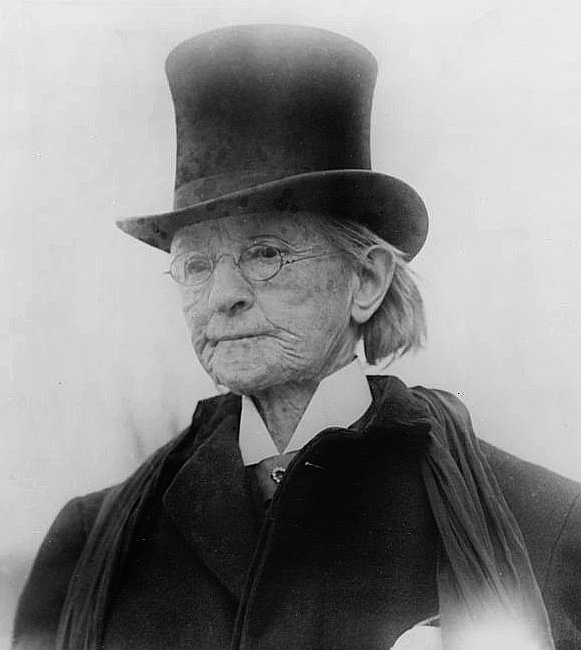Along with temperance, abolition and suffrage, dress reform was a major movement spearheaded by women in the 1800s. Females at the time were encumbered by garb that was cumbersome–and occasionally even dangerous–and wanted the right to wear more “rational clothing” without fear of reprisal, even arrest. One of the most outspoken of dress reformers was Dr. Mary Walker, a brilliant surgeon who wore a military uniform while providing medical attention to soldiers during the Civil War. After the war, Walker was so vehement and forceful in her insistence on women wearing men’s clothes that she was shunned, for the most part, by men and women alike.
This undated classic photograph shows Walker late in life, adorned in formal men’s wear. From an article about her in the March 12, 1886 New York Times:
“Newport, R.I.–This evening Dr. Mary Walker was for a brief period detained at the police station, where she expressed her surprise and disgust at the officials of a city who did not know the law, and who had laid itself liable by obliging her to accompany Officer Scott from Commercial Wharf to the office of the Chief of Police. The doctor arrived here by boat from Providence at 6 o’clock, and desired to be shown the residence of Miss Sarah Briggs, an old friend whom she had not seen since the Union soldiers were taken to Portsmouth Grove, near this place, for treatment during the civil war. She had been pleading in Providence with the members of the Legislature in behalf of woman’s suffrage, and for the payment of a Revolutionary claim which she claimed the State owed her friend Miss Briggs. She had no sooner reached the plank walk when, at the instance of several females who had seen her on the boat, the officer told her that she must accompany him tot he police station. She told the officer her name and said that he was violating the Constitution by interfering with her freedom. The officer, strange as it may seem, had never heard of Dr. Mary Walker and he insisted upon taking her to the station.
The doctor reluctantly accompanied the officer, and was followed by a crowd of men and boys, who, it would appear, had never seen a woman dressed in men’s clothing before, and it was a sight which they will never forget. The Chief of Police, being a man of intelligence and conversant with the laws, expressed his regret at her arrest, and apologized for his officer, who, he said, had acted in good faith. This would not satisfy the doctor, who was naturally very angry, and she insisted upon learning the officer’s name, and demanded that he be discharged from the police force. She was forced to admit, however, that she had been arrested in other cities by mistake. She remained at the station for some time, and repeated the law for the benefit of the officer who had arrested her. She also delivered quite a lecture upon sundry subjects, for which she is noted, and then walked out of the office with her hat on one side and with her cane in a very dudish position. The incident created a decided sensation. She will leave town to-morrow. It is rumored that she does not intend to let the matter drop, and a few wiseacres predict that she will try and make trouble for the city.”
Tags: Mary Edwards Walker

